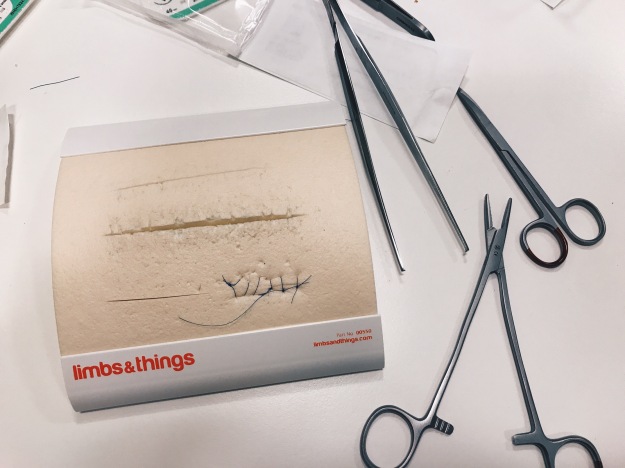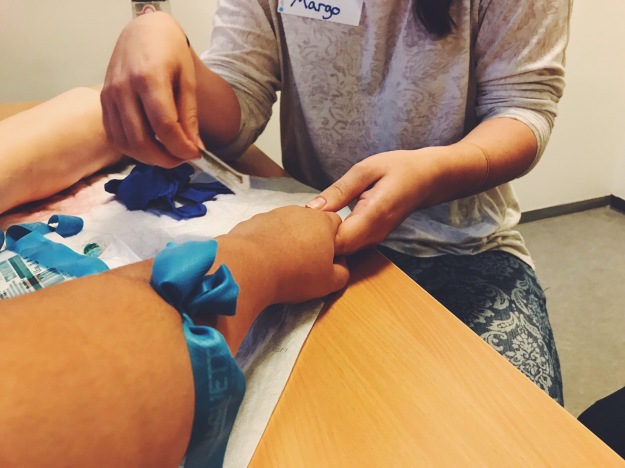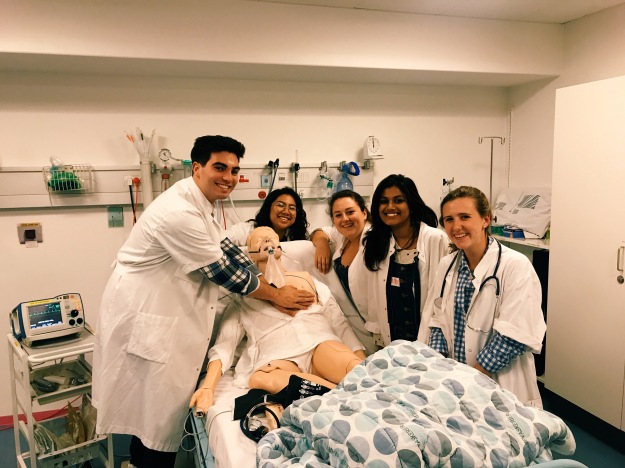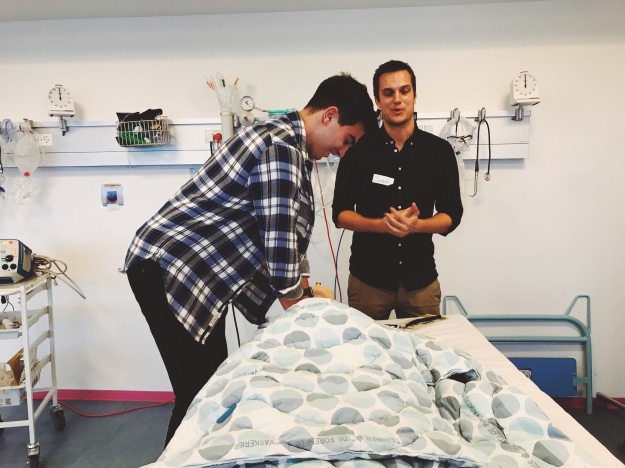Study abroad is a whirlwind of emotions, happenings, and adventures. It can really be overwhelming at times, especially when you have study tour coming up and midterms at the same time.
It may come as a surprise: but sometimes you actually have to study while you’re abroad. I know, crazy, such a concept. But really, this is something that we have a tendency to blow off, but in reality, the classes abroad while challenging, are a little bit easier than at university. Maybe I’m just crazy, but I’m really grateful to not be in physical chemistry right now like most of my cohorts back home (sorry guys.)
So here’s a short guide to actually studying while studying abroad.
FIND YOUR SPOT.
One of the most important things about studying is finding somewhere where you feel comfortable, but not so comfortable you’ll fall asleep while reading.
This spot can be different depending on the work you’re doing: is it math or language homework where you are going to be a little bit more active? This type of work I can do at my desk in my room with music playing.
Is it reading? This can require a more quiet, dedicated study space than maybe the desk in your room or your bed. Personally when I know I’ll be reading for a while, I have to physically be away from my bed or anywhere else that’s super comfortable, and where I’ll be distracted or tempted to do something else.

Your spot is unique to YOU and your studying needs obviously. I have friends who like to study predominantly in their beds, which is cool but I would take a fat nap before finishing my readings. Some people need complete silence to work, but I like white noise, music, or even the hum of people chatting in a cafe with the music playing overhead.
Find a spot that works for you and what you’re setting out to do. Identify them as yours and as a place to work and study and you’ll find yourself having a much easier time actually being productive.
A few of my favorite spots to study in Copenhagen are:
- Our LLC kitchen: this one only works for me when everyone else is studying or if I’m alone, but it’s nice to have a welcome break when a new face pops in to chat for a little bit. Studying can sometimes feel really isolating, especially if you start to get FOMO because you’re studying abroad.
- Cafe Nutid: I wanted to keep this place a secret, buried in my mind but the fact that it is completely not-for-profit, with all of it’s profits being donated and is run entirely by volunteers, it’s hard to not want people to go spend their money there. Their pastries and drinks are really affordable, and although they don’t have a student discount, their prices are on par if not cheaper than most places that do. Please go support them if you’re in the city! They always have the right songs on their playlist, and the cinnamon rolls (or cinnamon snails as they call them here in Denmark) are always fresh in the oven and they make the whole place smell like freaking Christmas.

Cinnamon snails at Cafe Nutid!

Honorary mentions: most of these aren’t places I’ve actually studied at, just had friends who go often and highly recommend!
- The Black Diamond library: super close by bike, kind of a trek by foot, but an amazing building that reflects the Danish welfare mindset. Here’s this beautiful public building that’s built and funded by and for the public. It’s not only a library but a mesh of old and new in it’s facade, and reflects the Danes want to revitalize the harbor area and to continually be serving the public.
- DIS library: really close and very open and bright.
I’d like to update this list as I go along so maybe check back if you’re looking for more! I don’t go to coffee shops often because the price of a latte here is a crime but I’ll keep you updated.
TAKE BREAKS.
I swear by the pomodoro method of studying. It’s the method where you work continuously for ~25 minutes and then take a short 5 minute break. It’s imperative that you do something different from what you’re doing: if you’re reading, don’t use your break to scroll and read your phone. Get up, move, do something. After a few chunks of repeating that, you can take a longer break ~15 minutes. It increases productivity and helps you stay focused for longer actually.
I use an app on my phone to remind me when time is up and when it should start, but some people just do this method because it comes naturally to them.
It’s also important to remember that taking a break from long bouts of studying is really important too. Sometimes you just have to leave it ALLLLL behind and go out and do something you enjoy. Don’t forget to be mindful!

Check out that beach sunset.

Part of the walk to and from Bispebjerg hospital, a view I already miss.

LLC fam goes to Amager beach, to “read” for class. A great mental break and destress.

Grabbed gelato before class, since it’s a 40 minute commute. No regrets.
PICK YOUR CLASSES WISELY AND ENGAGE.
I chose DIS because the Medical Practice & Policy program is something that really appealed to me as a pre-medicine student. The opportunity to learn in a hospital and from actual doctors was not something I would ever pass up, and I supplemented my core course with things that interested me and built on the things I’m currently involved in back home or plan on being involved in later in my career.
Here’s a list of my classes:
- Human Health and Disease: A Clinical Approach
- Complexity of Cancer
- Medical Ethics
- Healthcare Strategies for At-Risk Populations
I decided against taking Danish because I knew it was a difficult language with phonetics that I would never get because I learned to pronounce things very differently, but also because I wanted to focus my energy into Public Health and Medicine. I’m also very lucky to have a Visiting Host Family, some friends, and an SRA that help teach me a little bit.
I chose my classes to fit me and to have some intersectionality. I knew Medical Ethics was a good idea to take as a pre-medical student but also because in order to really have a base in healthcare you should have a basic understanding of Medical Ethics. It also ties into my Complexity of Cancer class, which focuses on the clinical aspects of cancer treatment, it’s taught by two oncologists. Oncologists have an oddly philosophical and ethical stance in medicine because their treatments are not always for a cure, and a lot lies in their hands, which causes them to have to consider the ethics of their decisions with more weight than say, a GP. Medical Ethics also ties into Healthcare Strategies for At-Risk Populations, where we talk about healthcare for populations such as: intravenous drug users, homeless people, undocumented migrants, prisoners, sex workers, etc. People tend to weigh their opinions on this very heavily, but what are the ethics behind the healthcare of the world’s most vulnerable populations?
It’s amazing how easy studying becomes when you’re engaged in what you’re learning. I often find myself trying to not speak so much in class, in part because it’s probably at least a little obnoxious (sorry guys, again) but also because I want to hear what everyone else has to say. That’s another thing about studying abroad: you get to meet so many people with such diverse backgrounds and different experiences who challenge you and engage you in discussions you wouldn’t have had with your peers back home. I know being a Biochemistry major that finished all of her general electives before college started, I really miss the discussion based classroom model that I got as an IB student. Pick classes that interest you and engage you and you’ll find integrating “study” and time “abroad” will be a breeze.

Here’s me playing pretend doctor. (I don’t quite deserve the white coat yet.)

I shadowed a cardiologist! Here’s one of the many cute little hearts on the ground in the cardio ward.
Please bear in mind that my advice is all very personal. Everyone and their goals are different, but really the most universal advice to give you is to remember what’s important to you! Pick classes you’ll care about because otherwise they will be a chore to check off your list before you jet off to your next destination. Pick a location you’ll actually want to live in, otherwise you’ll always be wishing for something else. Engage in things you actually care about otherwise you’ll find yourself always waiting for the next thing, and then all of a sudden you’re home and wondering what went awry. I hope this gave you some insight on what it’s like to actually be a student abroad. I’d love to hear what you’re thinking about studying or different things you’re considering.
Wish you were here,
Rigel






















